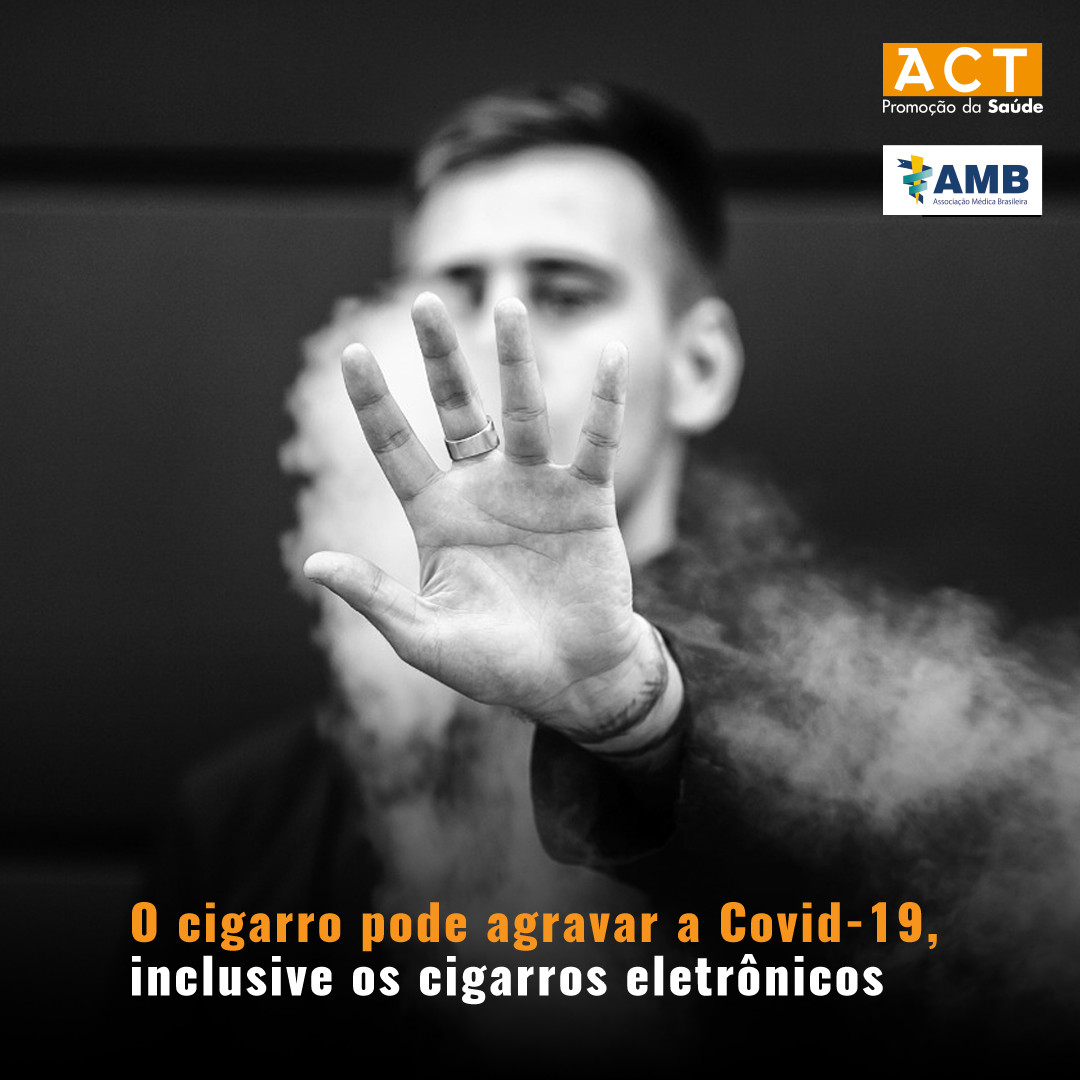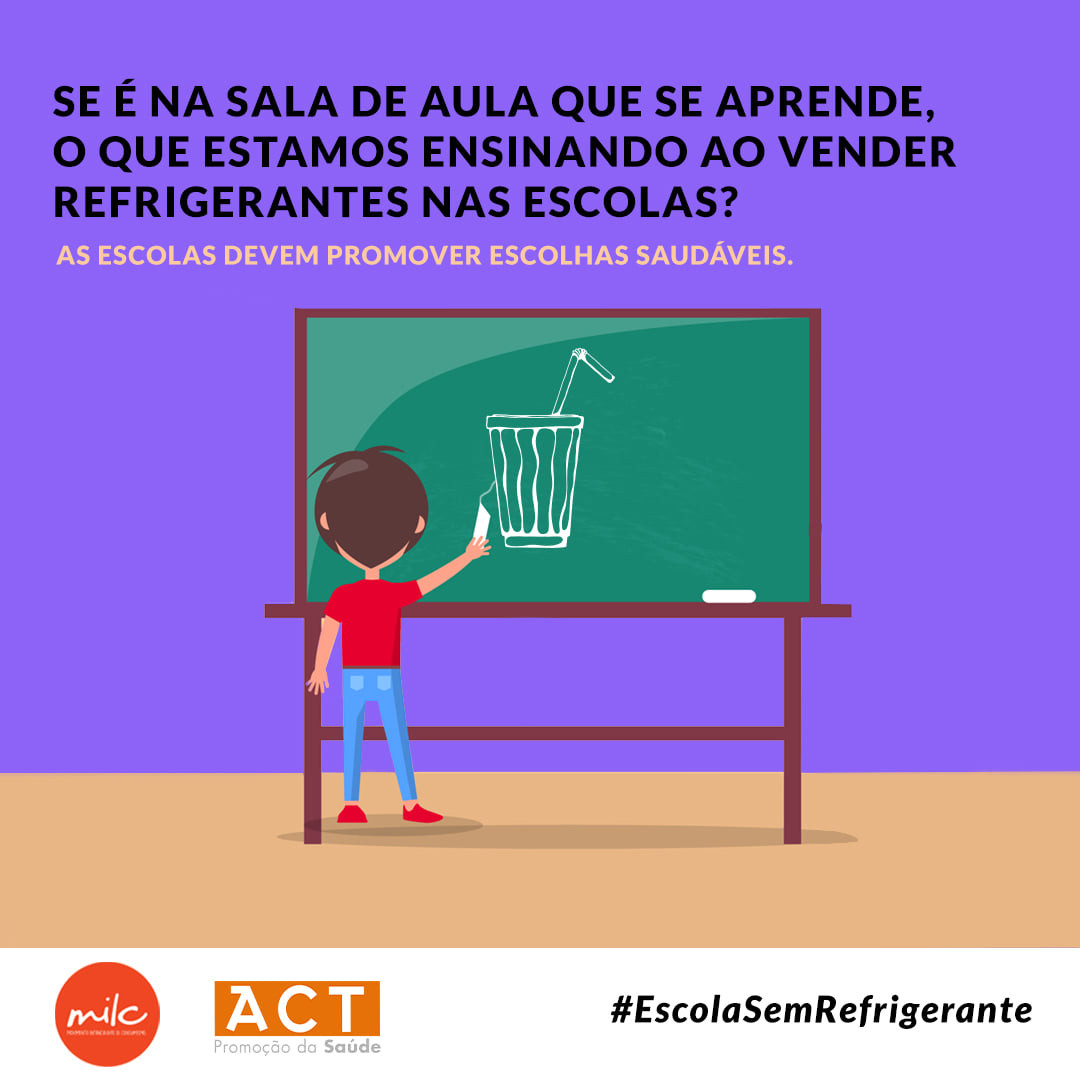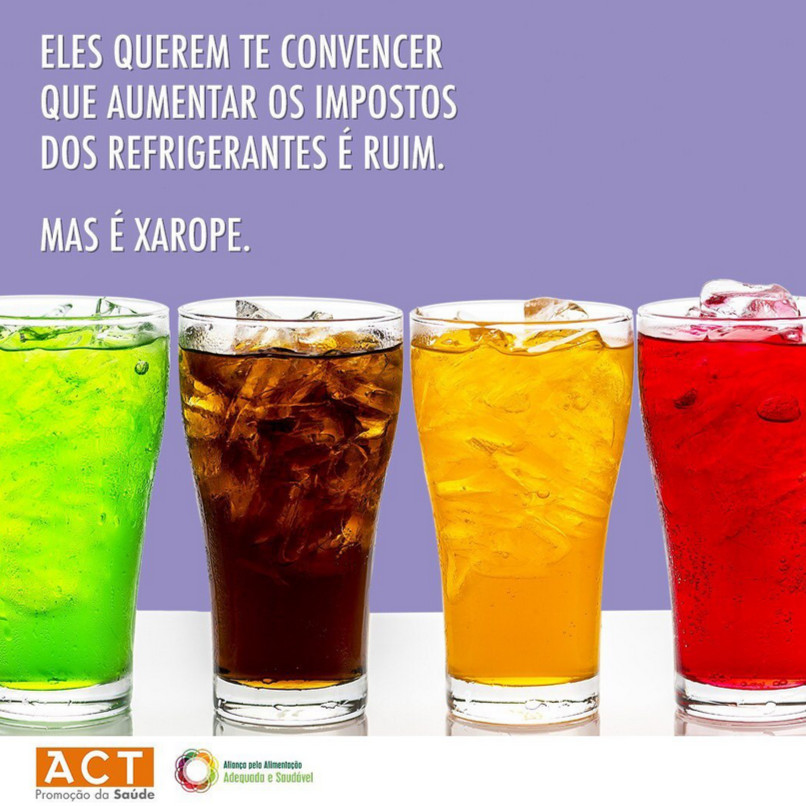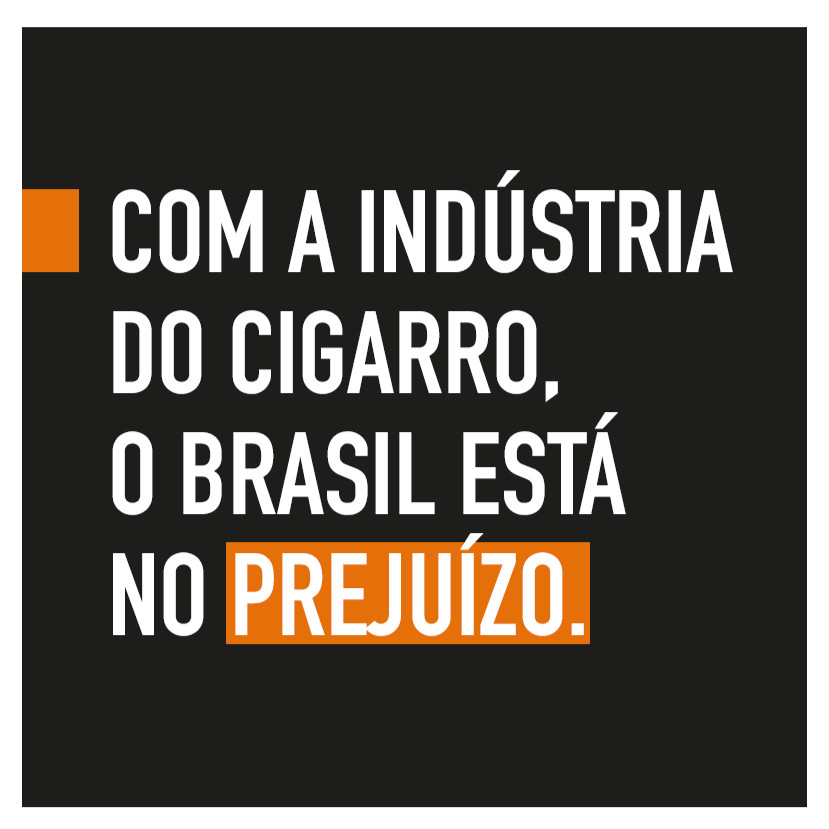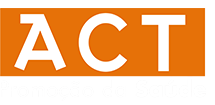2020 Review | ACT Bulletin 167
15.12.20ACT
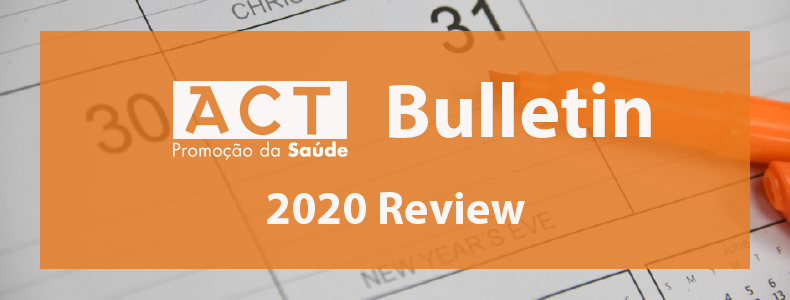
 Editorial
Editorial
The Covid-19 pandemic has had an unprecedented and unexpected impact on all actions performed in 2020. In terms of our work with the prevention and control of chronic non-communicable diseases (NCDs), which include cancer, diabetes, cardiovascular diseases, among others, the arrival of the new coronavirus further highlighted the importance of public policies for health promotion, especially because smoking, poor eating habits, alcohol abuse and physical inactivity may account for a large share of serious cases of Covid-19. The disease also drew attention from society regarding the need to work continuously for larger investments and improvements to the Brazilian Single Health System (SUS).
Specialists have recently been working with the concept of a sindemic, in other words, a meeting of different pandemics and a combination of complex factors that need to be faced through joint actions. In that equation, another element to be confronted is the major social and economic inequality, which leads more vulnerable segments of the population towards greater susceptibility to Covid-19 and its complications.
Throughout this year, we have gained more detailed knowledge on these issues, at the same time that we have improved our knowledge on themes relating to the irreconcilable conflict of interests between the harmful product industries and public health.
In our campaigns, we have focused on the tax reform, seen as a unique opportunity to face the question of SUS underfunding and contribute towards promoting equality, sustainability, wellbeing and the health of the population. We reinforce the importance of measures such as tax increases on harmful products, whose consumption, on being reduced, results in an improvement in the health of the population and an increase in capital raising through tax collection, aiding economic recovery.
In this, our last Bulletin for the year, we review the main actions in which we took part in 2020, broken down into the main themes we worked on. It would be impossible to be so actively participant in many of the movements without the dedication and support of each person on our communications team and the various ACT teams who work in synergy, as our legal, advocacy and financial/administrative departments, as well as tobacco and food products, and our board of directors.
On behalf of ACT, I can say to those who read us, follow us, share our posts and support with us, that we are immensely grateful for the partnerships and collaboration with other organizations and members of our networks and alliances, for the recognition by our funders and for the great friendships we have formed throughout such a challenging journey.
In 2021 we stride towards our 15th year, which gives us great pride for our path travelled thus far, but reinforces even more our responsibility and the conviction of how important it is to have you by our side. It is essential.
Season’s Greetings to all and may 2021 be filled with hope.
Anna Monteiro | Communications Director
____________________________________________
Covid-19

Among the actions and projects that ACT have promoted to inform and clarify about the risks related to the coronavirus and Covid-19, are:
-
Fighting fake news
The spread of fake news was already a growing problem even before the advent of the new coronavirus. ACT sought to collaborate with clarifying information related to our guidelines and formed a partnership with the Eté Checagem agency.
Some of the joint publications with Eté addressed the demystification of news which declared that vitamin D would help to fight COVID-19 and the confirmation that electronic cigarette users would be more susceptible to complications from the disease.
A study was published in April suggesting a supposed protective effect by nicotine in the fight against coronavirus that was widely disseminated in the media. However, this had not undergone a peer review and one of the authors had already received financing by the tobacco industry, which configured a conflict of interests and diminished credibility in the work. Thus, ACT published a note in cooperation with other health area organizations to clarify the issue and show that there was no independent evidence to corroborate the study.
-
Monitoring the industry
In 2020 the periodical monitoring bulletins for the unhealthy product industries prepared by the ACT team started to be published quarterly, with versions in Spanish and English.
Some of the main actions identified this year were related to the Covid-19 pandemic and made it clear that companies were taking advantage of this period to roll out a large number of initiatives to try to improve their corporate image and sell more products, even though they are responsible for a variety of harmful health effects.
Some of the examples are donations, such as the distribution of hand sanitizers by Ambev, used mainly as a form of advertising, and the direct publicity for beer brands through live musical events, a phenomenon typical of the social distancing period. In the September edition of the ACT bulletin, Clarice Madruga revealed more about the problems caused by alcohol advertising during the pandemic.
All issues of the monitoring bulletin are available on our website.
-
Risk factors for NCDs and COVID-19 complications
Smoking, poor eating habits, alcohol abuse and physical inactivity can also contribute to Covid-19 complications. With that in mind, in a special edition of the ACT Bulletin on Coronavirus and NCDs published at the end of March, we interviewed field specialists to understand how people could better protect themselves during the social distancing/isolation period, for example, with tips on healthy eating habits and exercising at home.
-
Solidarity programs
Since the beginning of the pandemic, we have selected some solidarity initiatives every month, such as fundraising, food collections, donations, and advertised them on our bulletin. Below are a few of them:
- Natal da CUFA: Christmas donations gathered by the United Center of Favelas (Central Única das Favelas - CUFA) were destroyed by an accidental fire at a distribution center in Heliópolis (SP). For that reason, CUFA started a new collection program to replace the lost items.
- IncaVoluntário: an initiative by the National Cancer Institute (Instituto Nacional de Câncer – INCA) to collect food items, powdered milk, geriatric diapers, toys, wheelchairs among other items for their patients.
- Evangelical Spiritist Association (Associação Espírita Evangelizadora): contributions through donations to be distributed at Christmas for children from Morro do Sampaio (RJ). Information for donations: Banco Itaú, Agência 0306, Conta Corrente 50829-2, CNPJ: 10.992.231/0001-82, Associação Espírita Evangelizadora.
____________________________________________
Tobacco Control
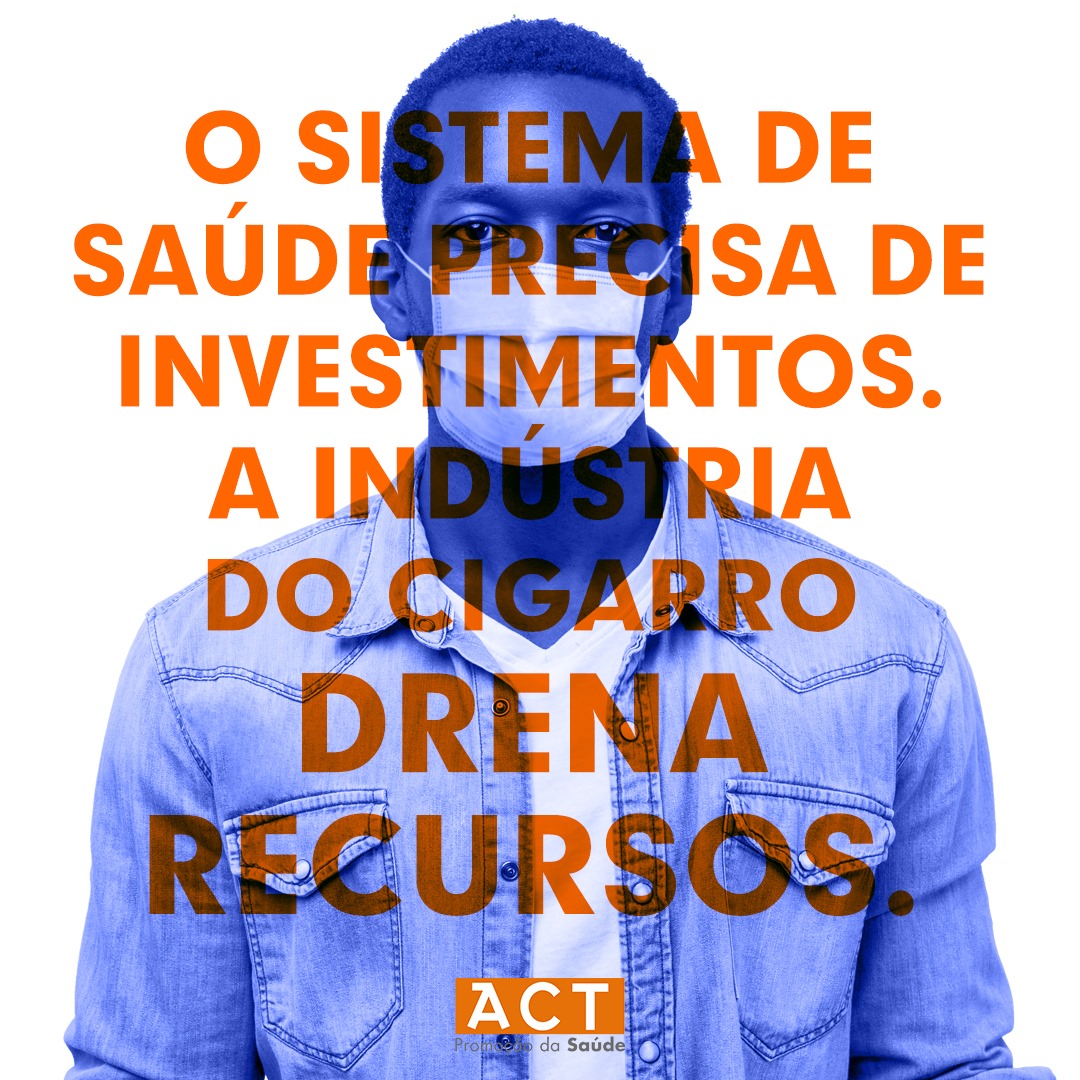 Cigarette Tab
Cigarette Tab
On the week of National No Smoking Day (Dia Nacional de Combate ao Fumo), in August, ACT launched the second stage of the “Cigarette Tab” (Conta do Cigarro) campaign, whose objective is to inform about the enormous burdens on health and on the economy caused by smoking and to support an initiative by the Federal Attorney-General’s Office (Advocacia-Geral da União - AGU) requesting that the largest tobacco companies in the country reimburse the Single Health System (Sistema Único de Saúde - SUS) for damage caused by their products.
The first publications in the new phase showed that there is an important international precedent, since in the USA a similar initiative has resulted in a reimbursement of over R$ 850 billion to the public coffers. Soon after, in September, an article in O Joio e o Trigo found that the costs for the treatment of diseases caused by smoking are just the tip of a gigantic iceberg in terms of losses caused by the tobacco industry to the government. To the extent that even payment of the product registration fee on the National Health Surveillance Agency (Agência Nacional de Vigilância Sanitária - Anvisa) was challenged by those companies.
The second phase of the campaign ended in late October, but the AGU initiative is still running through the courts. We will continue our surveillance and continue producing material supporting the accountability of the tobacco industry for the burdens brought on by smoking.
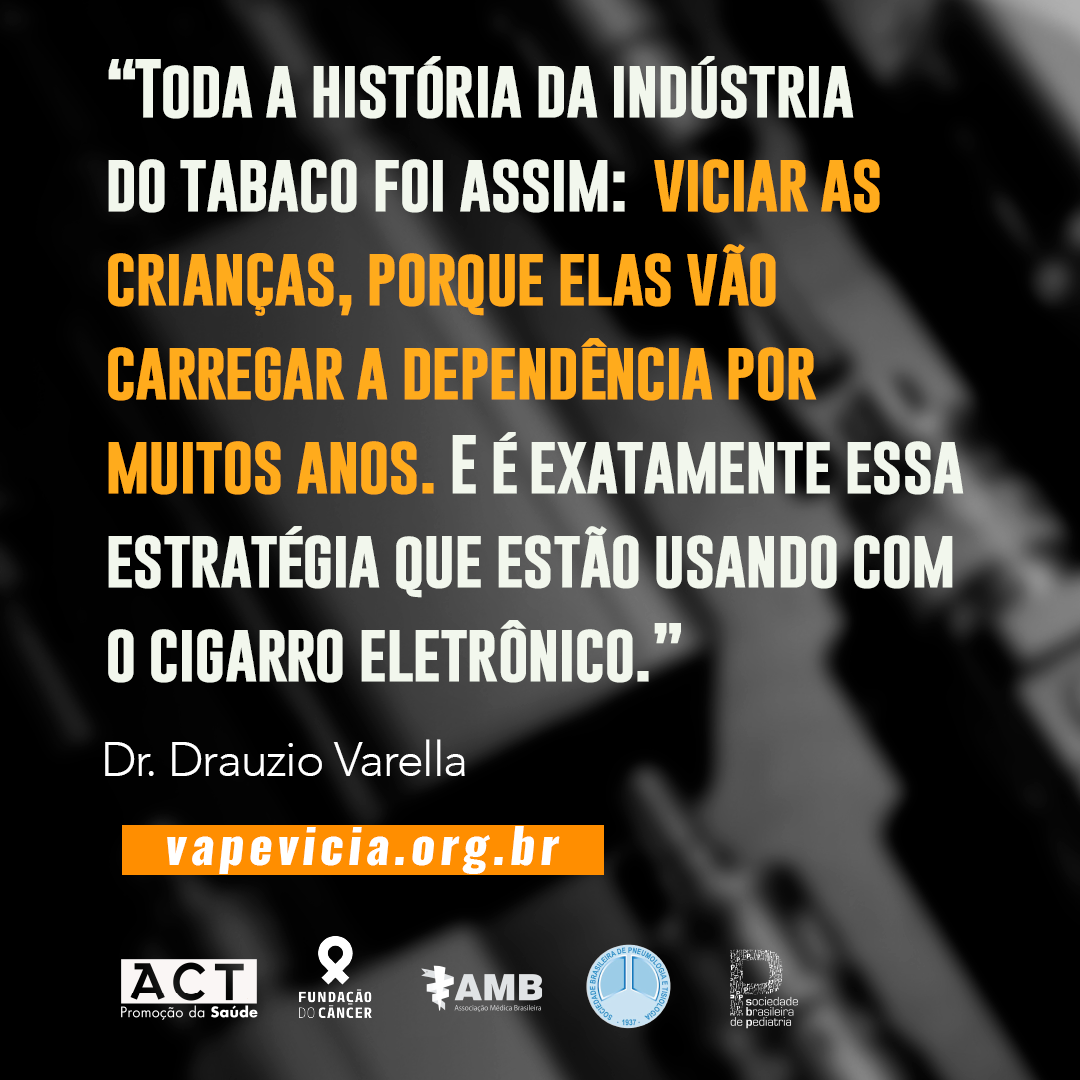 Electronic cigarettes and other electronic smoking devices
Electronic cigarettes and other electronic smoking devices
In the first semester ACT promoted the Vape Vicia (Vaping is Addictive) campaign to raise awareness in the population, especially among youths, about the negative effects of e-cigarettes and other Electronic Smoking Devices (Dispositivos Eletrônicos para Fumar - DEFs). These products, forbidden by ANVISA, are promoted by the industry as a supposedly safer alternative and directed at people who are unable to give up smoking. In reality, however, things are very different, since the marketing strategies used by the companies, such as sweet flavors, sponsorship for parties and shows and promotions, among many others, are aimed at a very young audience. Additionally, these devices also contain toxic substances and are harmful to the health of consumers.
Also in May, ACT and the Pan-American Health Organization organized a live event with Dr Drauzio Varella, to celebrate a prize awarded to him by the World Health Organization, and electronic cigarettes were one of the first subjects discussed. In November, an article in O Joio e o Trigo also revealed how the industry promotes these products to much younger audiences than the companies admit to targeting.
Additionally, studies have shown that electronic cigarettes are not effective in helping people to give up smoking. To contribute to the discussions, ACT also organized a webinar with the theme “Electronic Smoking Devices and Smoking in Times of Pandemic” and collaborated with the document “Electronic cigarettes: what do we already know? What do we need to know?”, produced in a joint effort with the Brazilian Medical Association and the Cancer Foundation (Fundação do Câncer).
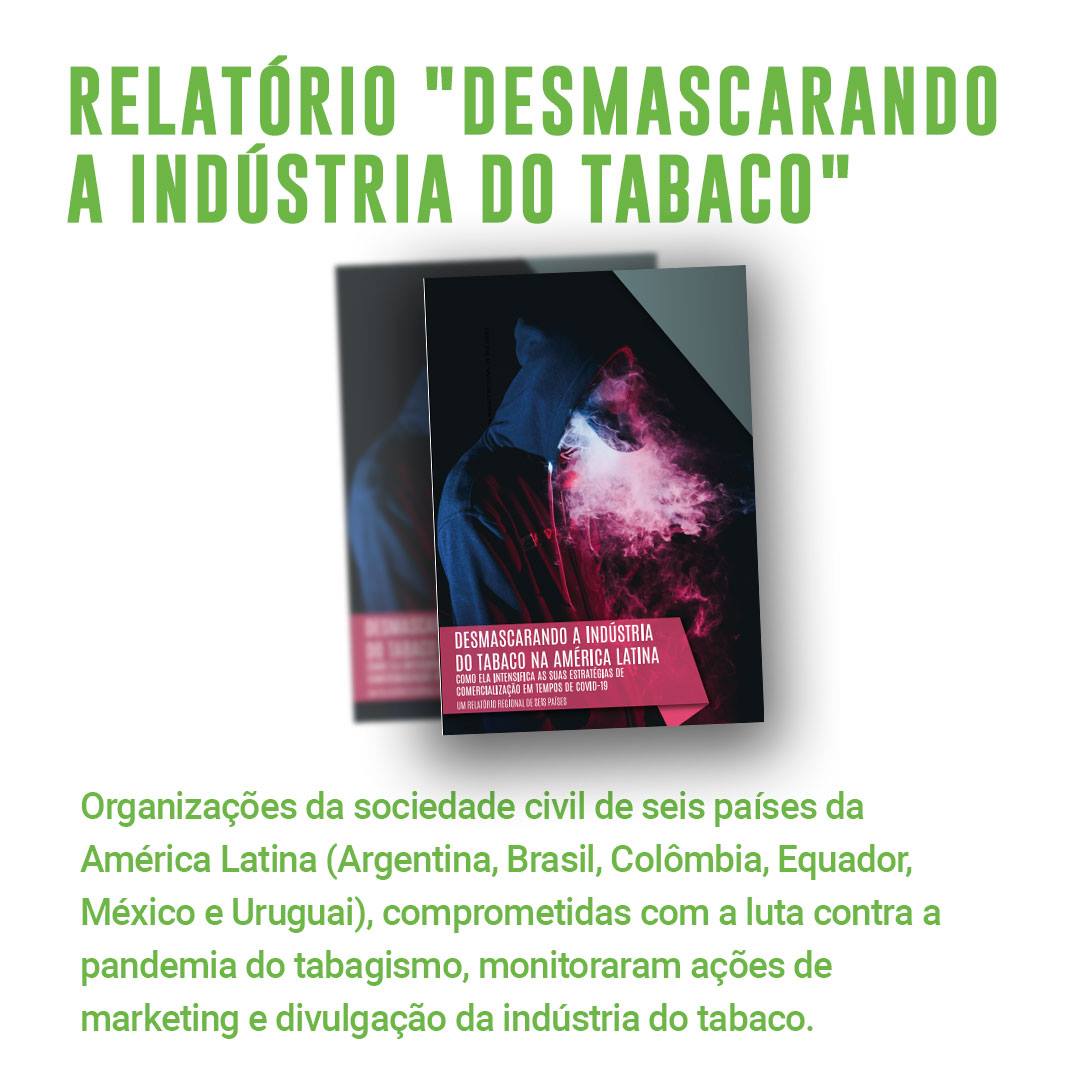 Monitoring the tobacco industry
Monitoring the tobacco industry
In addition to our periodical industry monitoring bulletins, where we examined many initiatives implemented by tobacco companies in 2020, the year has been marked by increasing collaboration with organizations from other countries in Latin America to carry out a joint assessment of the industry’s activities in the region.
In July, this partnership resulted in a report called “Debunking the Tobacco Industry in Latin America” (“Desmascarando a Indústria do Tabaco na América Latina”), with information on marketing actions for cigarettes during the pandemic in six countries. Results showed that despite consumption of tobacco products being associated to a higher risk of Covid-19 complications, the industry intensified its actions for dissemination and commercialization, both for their cigarettes and for their new generation of products, electronic and heated tobacco cigarettes, taking advantage of the advance in the pandemic and government confinement measures.
November saw the launch of the 2020 edition of the Tobacco Industry Interference Index (Índice Global de Interferência da Indústria do Tabaco), which assesses how industries try to influence public policies in many countries and how governments protect themselves from this interference. This year, Brazil was the country with the biggest fall in the world ranking, which means that there were more cases of interference reported. Further information on the industry’s activities in this country can be found on a specific document on Brazil, detailing each one of them. A regional version of the report has also been drafted, contemplating Latin America.
It is undeniable that the tobacco industry continued to use a variety of strategies, whether through corporate social responsibility programs or direct political incidence, to hinder demonstrably effective measures to reduce smoking. Another method used is covert sponsorship of organizations such as the Foundation for a Smoke-Free World. According to an analysis made by the STOP initiative, this foundation presents itself as “independent and non-profit”, but is financed exclusively by Philip Morris and its activities resemble public relations and advocacy actions for the industry more than they do scientific research.
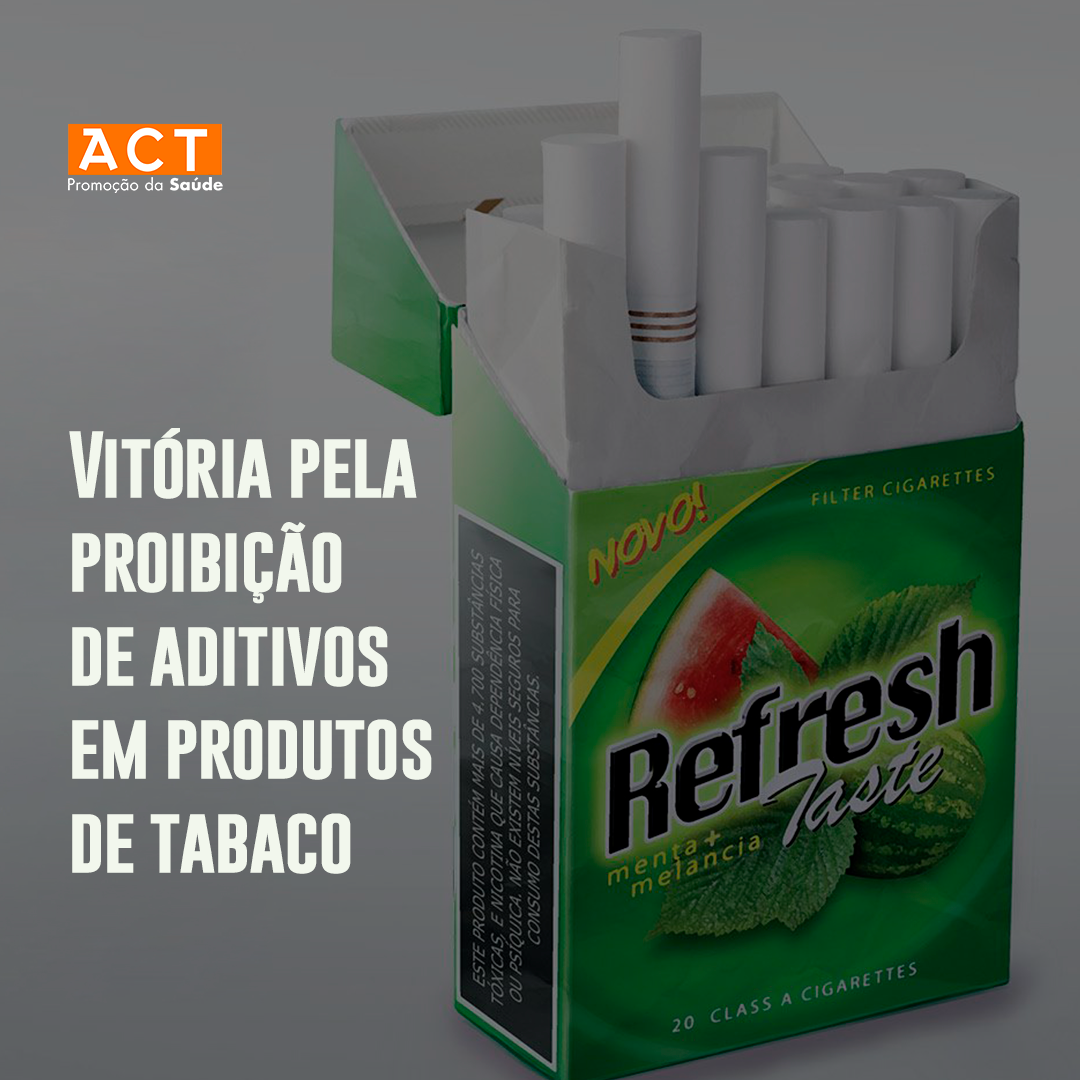 Additives in cigarettes and other tobacco products
Additives in cigarettes and other tobacco products
In October 2020, we had an important breakthrough for regulation of the use of additives in tobacco products to be finally implemented: the Federal Regional Court for the 1st Region confirmed that the National Health Surveillance Agency (Anvisa) has the power to pass the ruling that determines the regulation and that it is constitutional. This decision consists of a mandatory precedent for all actions with the same object. There is still possibility for appeal, but this was an essential step to reinforce the validity of the Collegiate Directive Resolution (Resolução da Diretoria Colegiada - RDC) 14/2012, which prohibits synthetic substances or natural substances with aromatic and flavoring properties in tobacco products.
In 2018, The Federal Supreme Court had already rejected a claim from the National Industrial Confederation with these questionings, but as a matter of quorum, did not grant a binding effect to the entire decision, which provided leeway for the dispute to proceed in other courts.
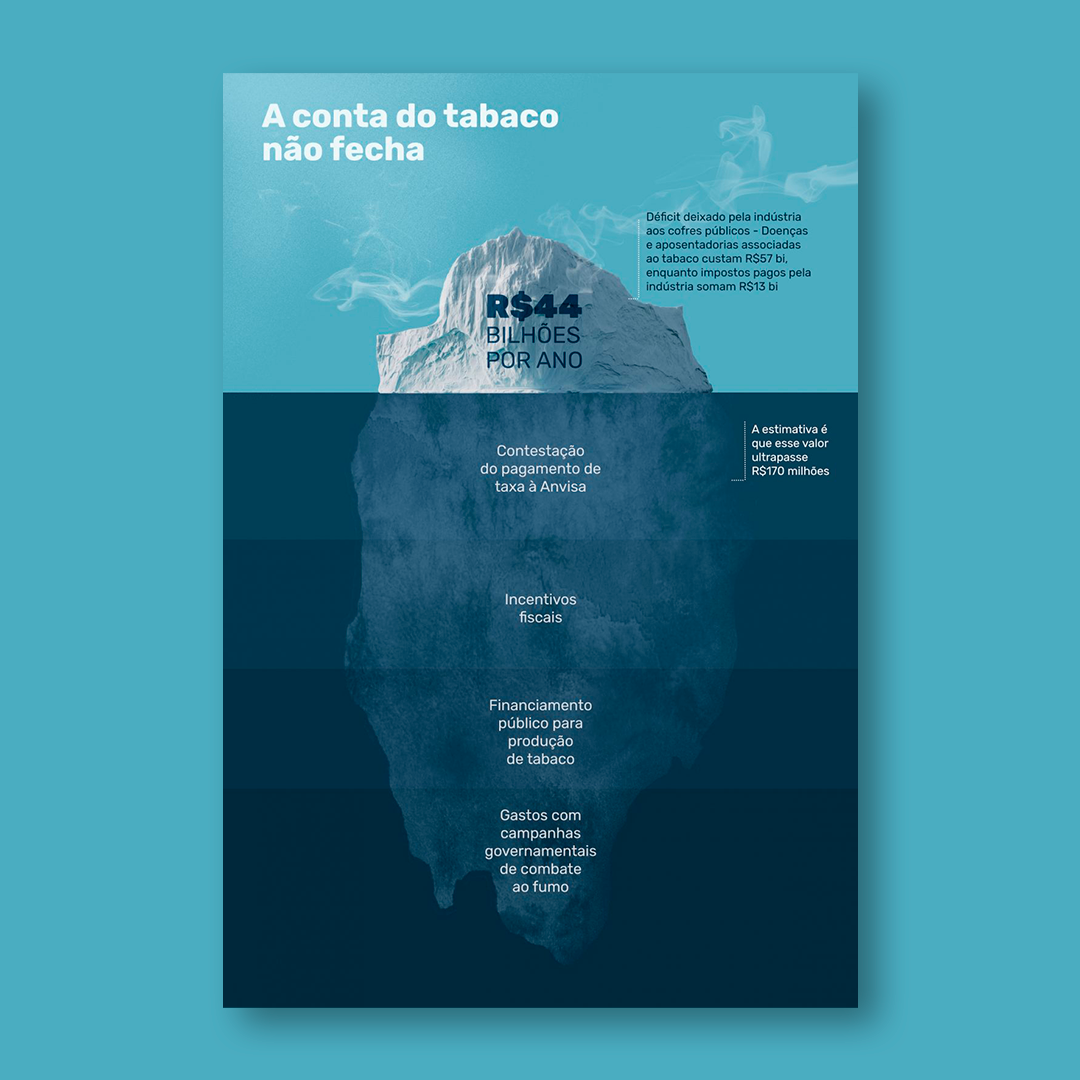 Taxation and the illegal cigarette trade
Taxation and the illegal cigarette trade
To increase the price of cigarettes and other tobacco products through a higher tax levy is one of the most effective measures in order to reduce the prevalence of smoking. The industry goes to great lengths to avoid it, and one of its main arguments is that a price increase would supposedly result in an increase in the illegal cigarette trade. International studies and experiences, however, have already proven that such an allegation is not a valid reason to avoid higher taxes being levied on tobacco products. Listed below are some of the articles and surveys published on the theme in 2020:
- An article in O Joio e o Trigo reveals how the industry overestimates figures related to smuggling in order to try to avoid price and tax policies
- Tobacconomics: Illegal trade of tobacco products does not need to hinder tobacco tax policy reforms
- Tobacconomics: case studies on Colombia, South Africa and the UK
- An analysis by researchers from the Catholic University of Brasília confirms that price increases reduce the prevalence of smoking
- A study uses four different approaches to estimate illegal cigarette consumption in Brazil; strategy praised in an article on the Tobacco Atlas website
- A note from the National Committee for Implementation of the Framework Convention for Tobacco Control (Comissão Nacional para Implementação da Convenção-Quadro para o Controle do Tabaco - CONICQ) highlights the importance of selective tax on tobacco products
 Judy Wilkenfeld Award
Judy Wilkenfeld Award
In September, ACT was given a very positive and gratifying piece of news: our Communications and Legal teams, represented by directors Anna Monteiro, Daniela Guedes and Adriana Carvalho, received the Judy Wilkenfeld Award for Excellence on International Tobacco Control.
Wilkenfeld was the founder of international program Campaign for Tobacco-Free Kids and a champion for the Framework Convention for Tobacco Control (FCTC). The award that bears her name is granted annually to tobacco control activists who have made noteworthy contributions towards reducing smoking levels in developing countries.
____________________________________________
Adequate and Healthy Foods
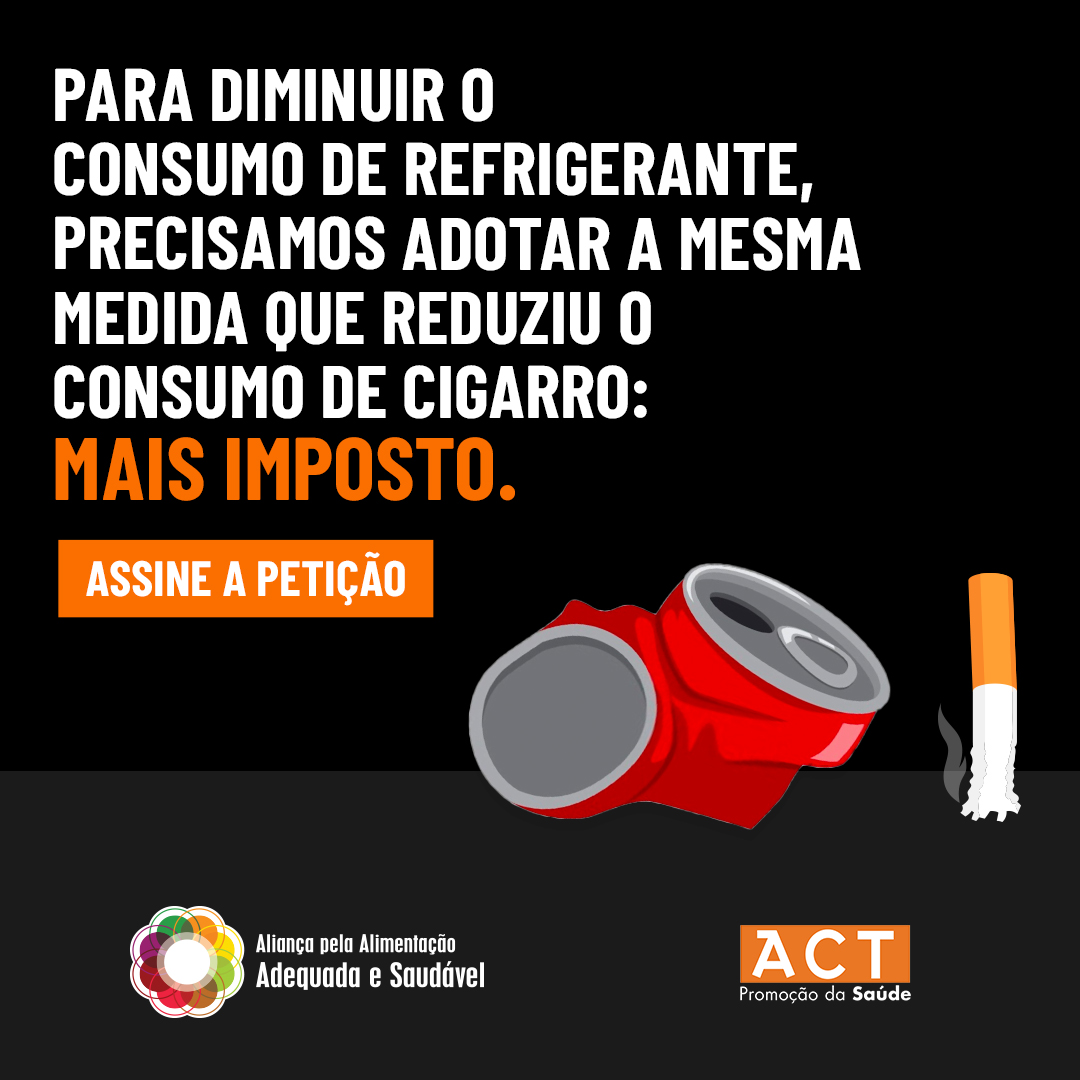 Healthy Tax Campaign
Healthy Tax Campaign
In an additional stage, the Healthy Tax (Tributo Saudável) campaign, run by ACT in association with the Alliance for Adequate and Healthy Eating (Aliança pela Alimentação Adequada e Saudável), reached over 17 million people, drawing attention to health problems caused by excessive consumption of sodas and other sweetened drinks. Another objective of the campaign was to mobilize the population for support and to put pressure on politicians to approve a tax on sweetened drinks through discussions of the upcoming Tax Reform, and almost 8 thousand people sent compelling “pressure e-mails” to Economy Minister Paulo Guedes, the President of the Senate, Davi Alcolumbre and of the House of Representatives, Rodrigo Maia, as well as to parliamentary members of the Tax Reform Joint Commission.
Campaign posters and billboards were scattered throughout newsstands and public clocks in São Paulo, Rio de Janeiro and Brasília, starting in August, and were seen over 26 million times. Campaign adverts also appeared in newspapers, magazines and websites. The campaign video, Blind Test (Teste Cego), was shown on primetime TV on subscription channels and had over 1 million views on Youtube.
On social media, weekly posts informed about the different types of sweetened drinks, alerting to the association of these products with diseases, showed the recommendation of the Dietary Guidelines for the Brazilian Population (Guia Alimentar para a População Brasileira) and gave examples from abroad. Each post generated countless conversations, where internet users expressed their doubts on the theme, opposition to the idea of tax increases and support for the measure.
Higher and permanent tax benefits
Despite the steady increase in the number of obese adults and children and prevalence of type 2 diabetes, the Federal Government increased tax benefits for the sweetened drinks industry, thus boosting the consumption of these products.
ACT and the Alliance for Adequate and Healthy Eating (Aliança pela Alimentação Adequada e Saudável) published a notice expressing disappointment with Presidential Decree 10.523, in October. The order maintains at 8%, indefinitely, the Industrialized Products Tax (Imposto sobre Produtos Industrializados - IPI) charged on soda concentrates and other sweetened drinks, a decision which benefits mainly companies located or with part of their production chain in the Manaus Free Trade Zone (Zona Franca de Manaus - ZFM). Before the publication of the decree, it was expected that the rate would be altered to 4% from December. The higher the IPI rate, the larger the tax credit for the industries that purchase concentrates inside the Manaus Free Trade Zone, consequently, the lower the tax collected by the Federal Government. With this change, the Brazilian government will fail to collect close to half a billion Reais in 2021, according to estimates based on data provided by the Federal Tax Office. These estimates also show that in 2019 alone, sweetened drinks industries who operate in the ZFM benefited from non-payment of R$ 3 billion in taxes.
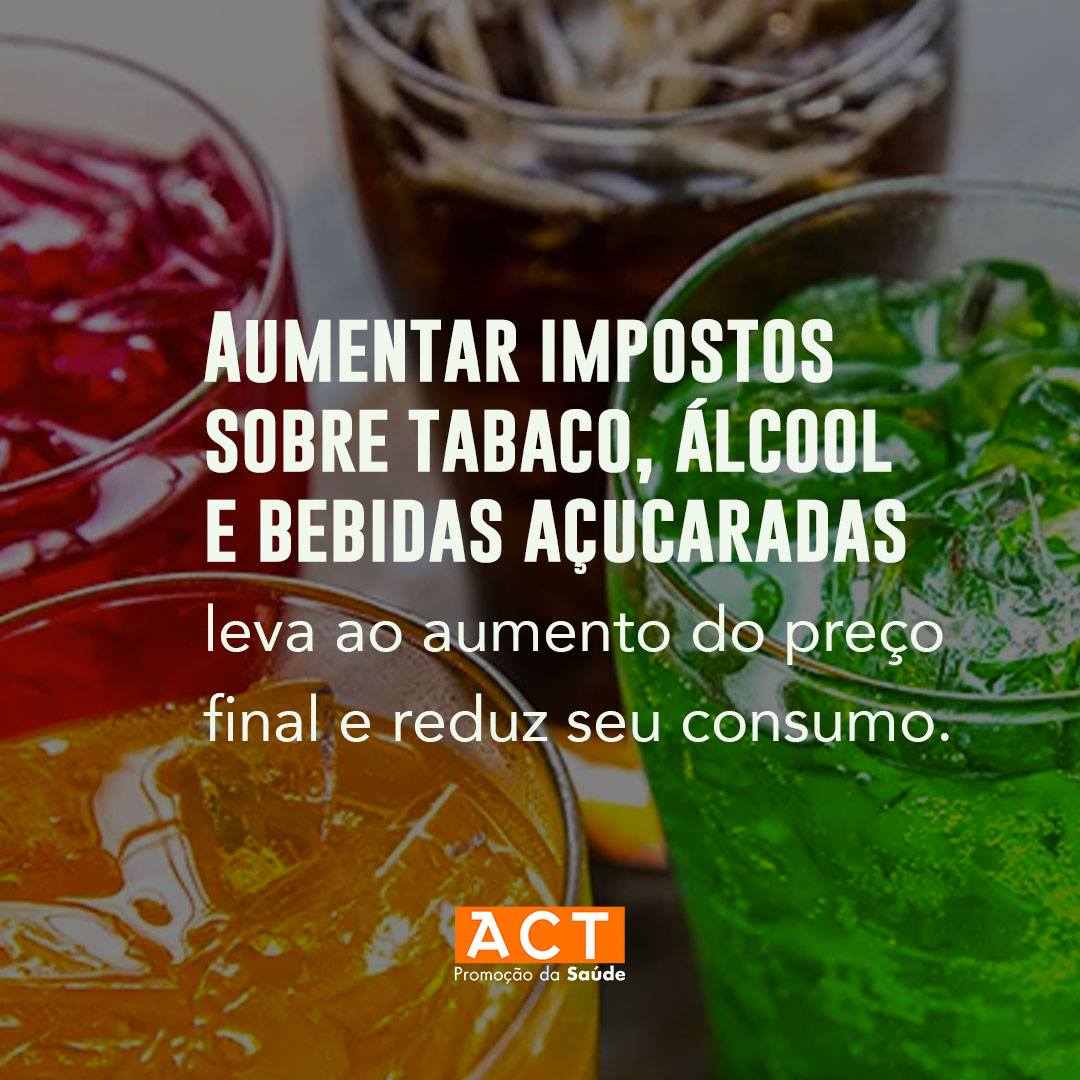 Webinars: Taxation and Health
Webinars: Taxation and Health
Throughout the year, we held three webinars on taxation and health, listening and promoting debates with specialists on law, economics, health and nutrition. The first online debate, in June, approached the theme of subsidies for soft drinks and the role of the Federal Supreme Court. The second webinar, in July, addressed the positive impacts of healthy taxes and the tax reform as an opportunity to favor public health promotion policies in Brazil. The third meeting, “Tax Benefits for Products that Damage Health: does this make sense?” (“Benefícios fiscais para produtos nocivos à saúde: faz sentido?”) addressed tax benefits for sweetened drinks and fossil fuel industries, which cause negative effects to health and to the environment.
The webinars featured partnerships with the Pan American Health Organization, National Cancer Institute, Brazilian Bar Association, Brazilian Consumer Rights Institute (Instituto Brasileiro de Defesa do Consumidor – Idec), National Institute for Social and Economic Studies (Instituto Nacional de Estudos Sócio Econômicos – Inesc), Terra de Direitos, Nupens-USP, FGV Direito SP, and Brazilian Association of Studies on Alcohol and Other Drugs (Associação Brasileira de Estudos do Álcool e outras Drogas) among others, and are available on the ACT Youtube channel.
Good for health, good for the economy
A tax levy of between 20% and 50% on sweetened drinks would increase government collection revenues by between R$ 4.7 billion and R$ 7 billion per year, with a positive impact on GDP of between R$ 2.4 billion and R$ 3.8 billion. More importantly, tax increases on this type of product would create 70 to 200 thousand jobs, depending on the tax rate.
These are some of the results of an unprecedented study made by the Economic Research Institute Foundation (Fundação Instituto de Pesquisa Econômicas - Fipe) at the request of ACT Promoção da Saúde, which simulates the economic impacts if Brazil were to adopt a special tax charged on sweetened drinks, a category which includes sodas, fruit juices and ultra-processed teas, milk and energy drinks with added sugar and chemical sweeteners.
The report made the newspapers and was officially launched at a webinar on the channel of financial newspaper Valor Econômico, which featured participations by Claudio Lucinda, from the USP School of Economics, Business Administration and Actuarial Science {Faculdade de Economia, Administração, Contabilidade e Atuária (FEA) da USP}, Paula Johns (ACT) and moderated by journalist Bernardo Mello Franco.
The simulations made by Fipe and other data on sweetened drinks consumption and associated diseases were given illustrated report, video and infographics versions, all hosted on the evidencias.tributosaudavel.org.br website. Also based on data from the research, an interactive impact simulator of the impact of taxes on the economy and on consumption was created, where internet users could select a tax rate value and visualize the consequences on consumption variation, GDP, amount of tax collected and job creation.
Taxation for new audiences
To promote the issue of tax on sweetened beverages as an effective public policy to reduce consumption and prevent diseases, ACT formed a number of partnerships with other organizations.
One of them was with the Kids Free From Consumerism Movement (Movimento Infância Livre de Consumismo - Milc), whose objective is to dialog with children’s parents and families. An article on the issue was published on Portal Lunetas during World Food Week in October, and we took part in two live events promoted by Milc on social media.
Another partnership was formed at the Nexo Festival for Public Policies, which promoted discussions around the theme throughout the month of October. ACT participated in a virtual panel on power relations and public health, with journalist Mariana Varella, economist Monica de Bolle, ACT general director Paula Johns, mediated by João Peres from O Joio e O Trigo.
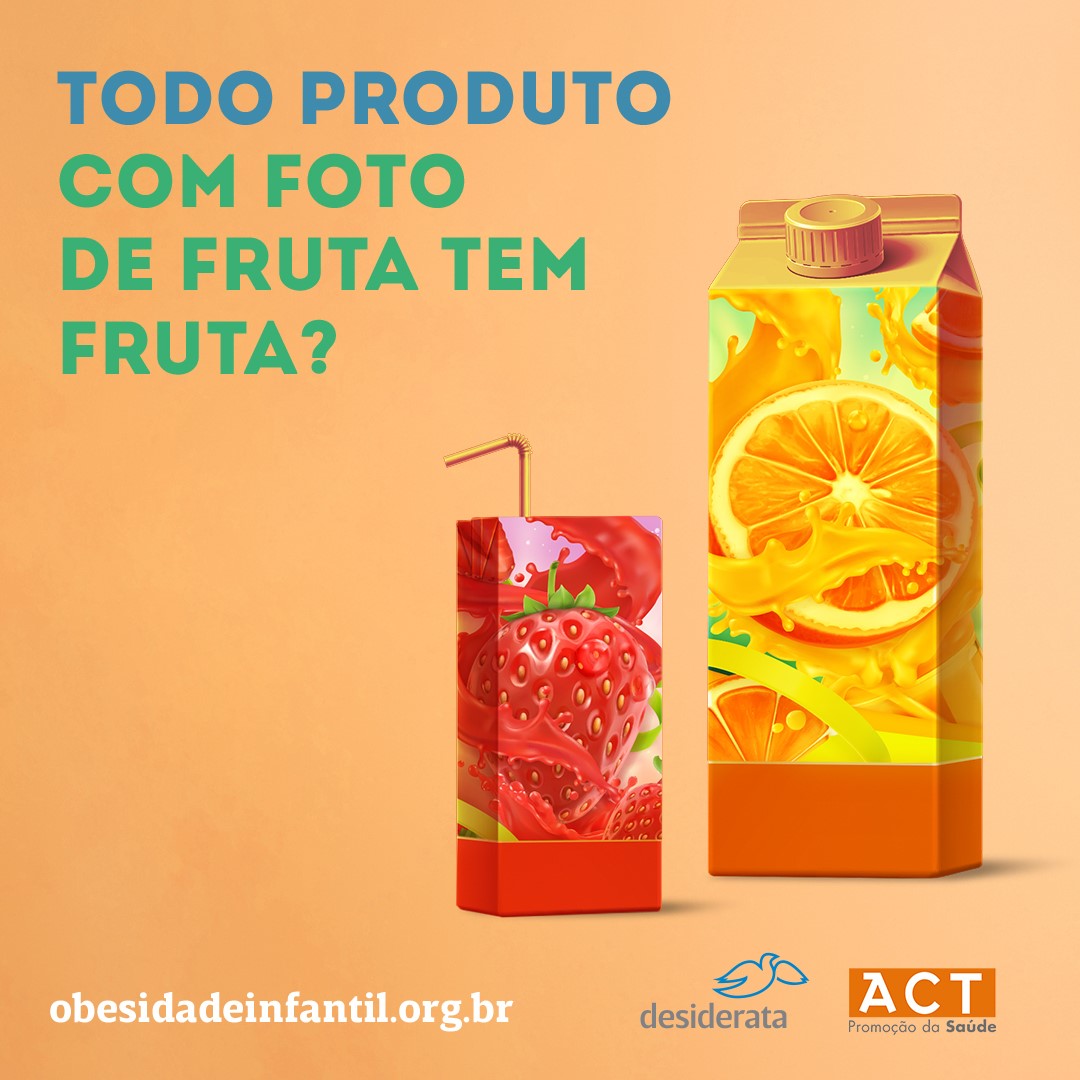 Child obesity is a public health issue
Child obesity is a public health issue
ACT was one of the supporters of the “Child Obesity is a Serious Issue” (Obesidade Infantil É Coisa Séria) campaign, from Instituto Desiderata, who addressed the theme by way of a socially responsible approach, with the objective of helping fathers, mothers and family members to understand the main risks and causes of excess weight and obesity in children to provide visibility to the role of public authorities in facing the problem. The campaign is hosted on obesidadeinfantil.org.br, where there is content published over the months of October and November. In addition to social media, other content can be found in printed media, magazines and segmented spaces.
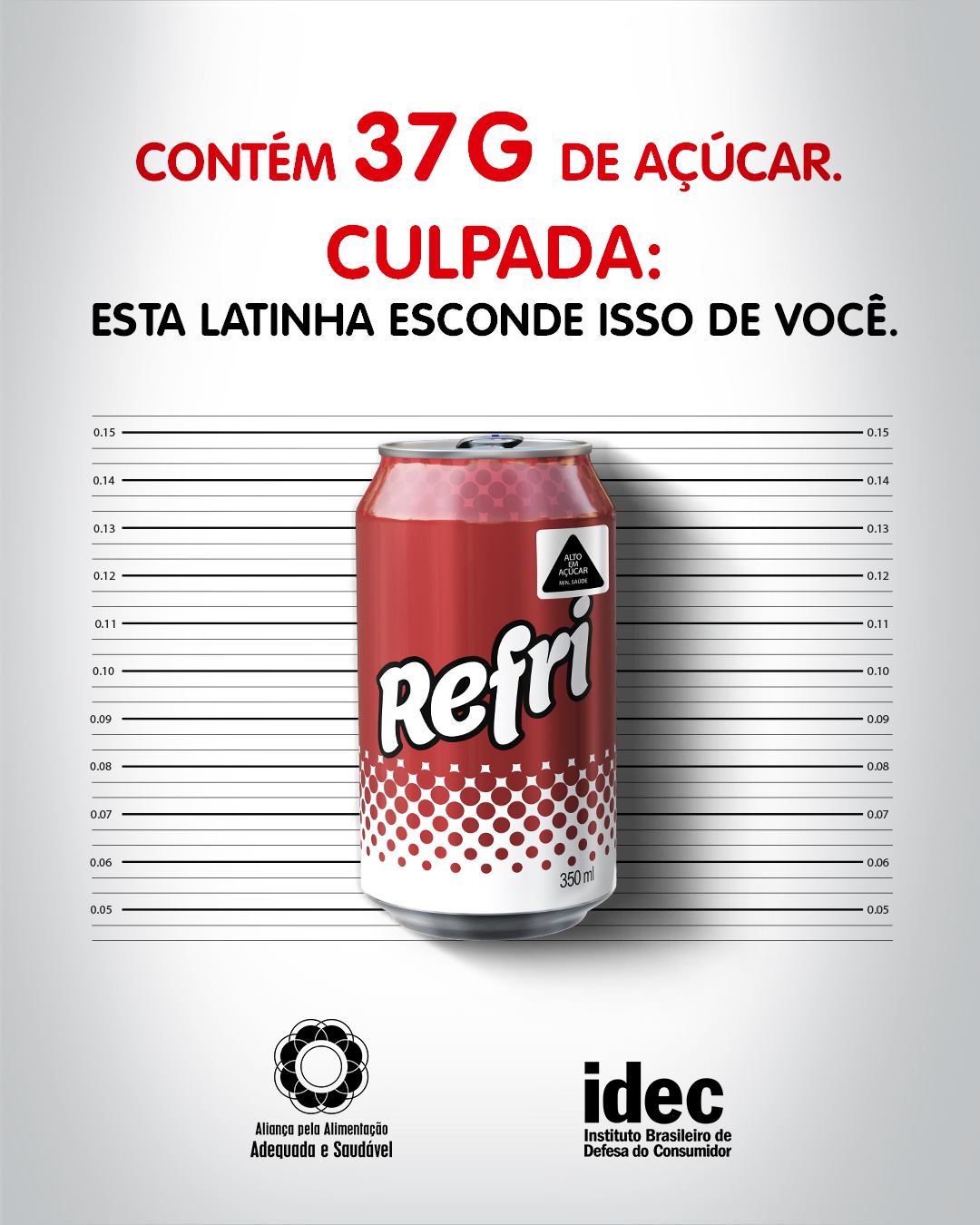 New food labelling
New food labelling
After six years of public debate and pressure from civil society, the board of directors of Anvisa approved unanimously in October new standard rules for nutritional information labels, mandatory on packaged foods, in addition to the creation of warnings indicating high concentrations of sodium, fat and sugar.
The approved magnifying glass model is smaller than the one submitted for public consultation in 2019, compromising legibility, and the nutrient profile selected for the front view warning does not contemplate critical substances such as saturated fats and sweeteners, for instance. Another point which has been criticized by the Consumer Rights Institute (Instituto de Defesa do Consumidor) is the long deadline given for compliance by the packaged food and beverage industries, who will only be obliged to alter their packaging two years from now.
After this deadline, in the case of specific products such as sodas with returnable packaging, the ruling still grants a further 36 months for compliance of the labels, amounting to a total of five years.
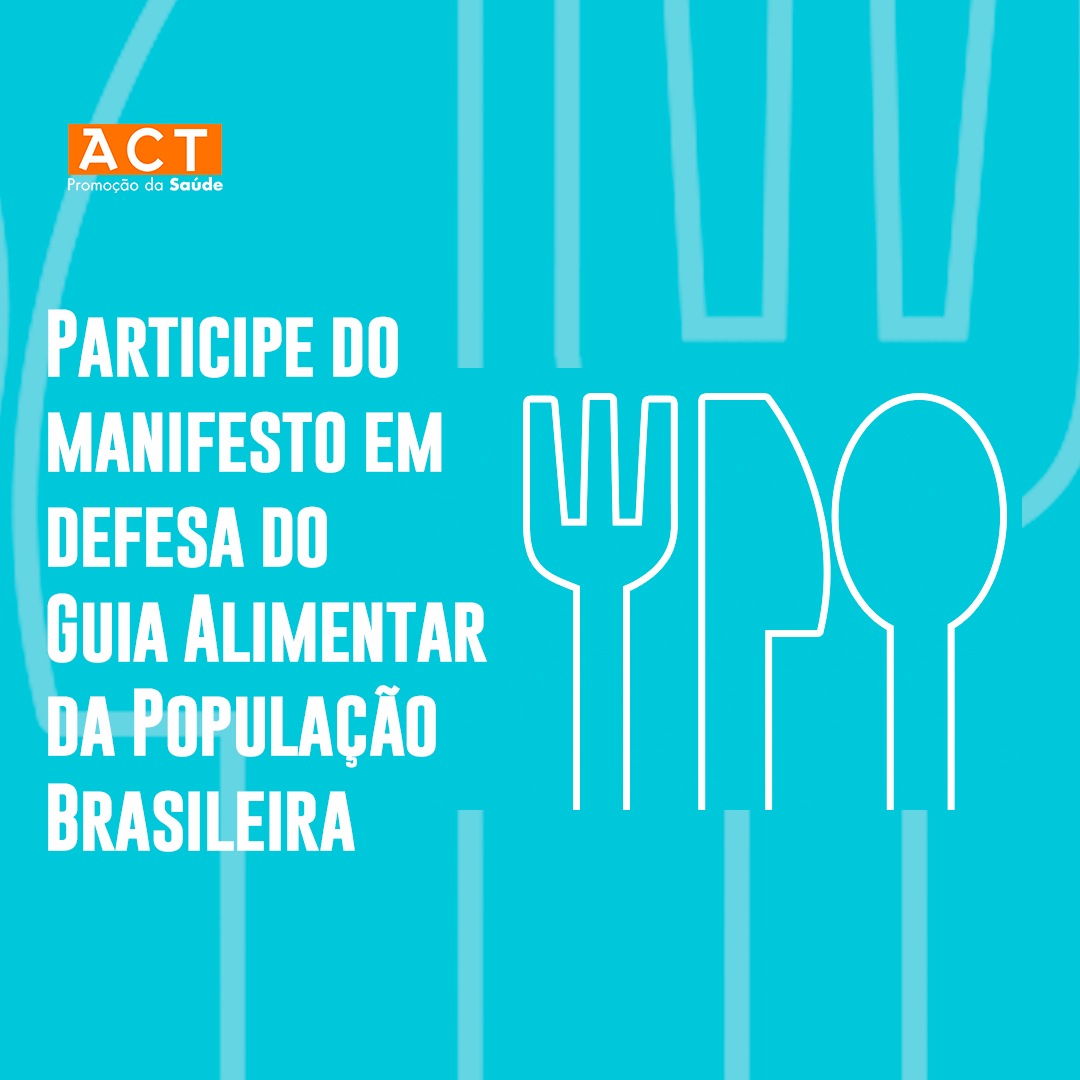 In defense of the Food Guide
In defense of the Food Guide
Over 46 thousand people and 350 organizations have signed a public statement by the Alliance for Adequate and Healthy Eating (Aliança pela Alimentação Adequada e Saudável) in defense of the Dietary Guidelines for the Brazilian Population (Guia Alimentar da População Brasileira). A technical note was made public in September by the Ministry of Agriculture, Livestock and Food Supply, that attempts to deny scientific evidence which attests to the health hazards caused by ultra-processed products. The technical note was to be attached to an official letter sent by Minister Tereza Cristina to the Health Minister, General Eduardo Pazuello, requesting a review of the Dietary Guide. After a negative backlash, the Agriculture Minister denied having requested a document review.
“It is the obligation of all public entities to protect the right to adequate and healthy nutrition. We understand that public institutions, including MAPA, must carry out their work respecting constitutional precepts and existing public policies, exempt from any interference by economic interests outside those of health promotion”, states a passage from the Alliance’s manifest.
____________________________________________
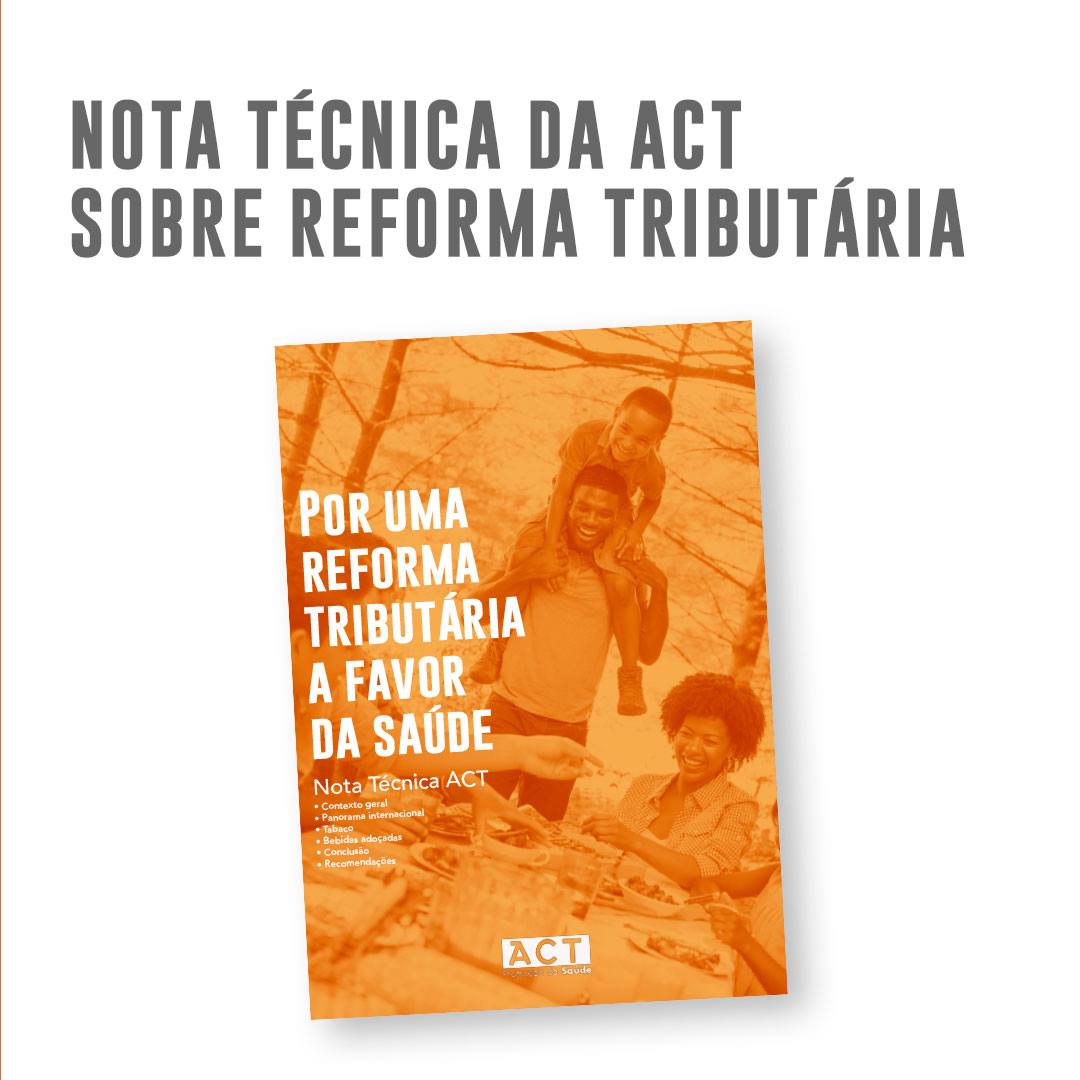 For a Healthy, Sustainable and Solidary Tax Reform
For a Healthy, Sustainable and Solidary Tax Reform
We view the tax reform as an opportunity to promote equality, sustainability, wellbeing and the health of the population. With this in mind, the ACT published a technical note in August for a tax reform in favor of health, reinforcing the importance of applying a heavier tax burden on products damaging to health, such as tobacco, sweetened beverages, alcohol and pesticides.
We have additionally joined and supported other organizations that work with social and environmental projects, also to promote measures that can be included in the reform in order to reduce economic disparities and foment sustainable practices. To find out more about these initiatives, visit the Pela Cidadania movement website and check out the article written by Marcello Baird, ACT Advocacy coordinator, together with André Lima, from Instituto Democracia e Sustentabilidade.
____________________________________________
NCDs
 World Cancer Day and TJCC Congress
World Cancer Day and TJCC Congress
ACT is part of the All Together Against Cancer Movement (Movimento Todos Juntos Contra o Câncer - TJCC) and the partnership remains steady in 2020. Two actions held this year are worth highlighting:
1. Bring a Handkerchief: action for World Cancer Day 2020
On World Cancer Day, celebrated on the 4th of February and before the contact restrictions due to the pandemic had even been implemented, ACT and the Brazilian Lymphoma and Leukemia Association (Associação Brlasileira de Linfoma e Leucemia - Abrale) hosted an action on Avenida Paulista, in São Paulo, focusing on prevention.
With a call for participants to “Come Discover your Future” (“Venha Descobrir o seu Futuro”) and a theme booth in the style of mystic elements, the event invited people to reflect on how their current habits could influence their health in the long run. Over 400 people participated, answering an interactive quiz and receiving a handkerchief, symbol of the campaign, as a gift. You can find out more about the event in an account published on the ACT blog.
2. 2020 Edition of the TJCC Movement Congress
The All Together Against Cancer Movement Congress took place, virtually, in September. ACT organized a panel named “Impact of the Pandemic on risk factors for cancer and accountability (“Impacto da pandemia nos fatores de risco para o câncer e accountability”), which spoke about the effects of Covid-19 on alcohol and tobacco consumption, eating habits and inactivity and the importance of recognizing and holding accountable the companies that manufacture products that are harmful to health.
The panel was moderated by O Joio e o Trigo journalist João Peres and the guests were specialists Vera Luiza da Costa e Silva, former head of the Framework Convention on Tobacco Control Secretariat, Ilana Pinsky, Medical Psychology PhD from the Federal University of São Paulo, Ana Paula Bortoletto, nutrition researcher from the University of São Paulo and Ricardo Brandão, Assistant Coordinator for the UERJ Exercise and Sports Sciences Post-Graduation Program.
ACT, represented by Paula Johns, also took part in the panel “Health promotion: cost or investment?” (“Promoção em saúde: custo ou investimento?”). For the duration of the event, we also coordinated a virtual stand where participants were invited to answer a quiz on the main cancer risk factors and what can be done to prevent the disease.
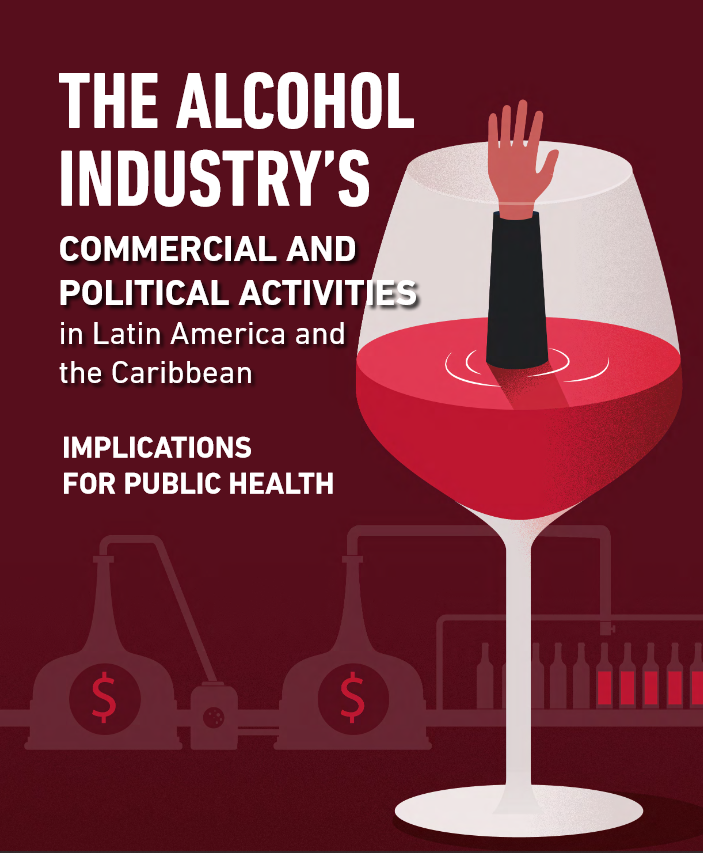 Commercial and political activities by the alcohol industry in Latin America
Commercial and political activities by the alcohol industry in Latin America
In August, NCD Alliance and various partners launched the “Commercial and Political Activities by the Alcohol Industry in Latin America and the Caribbean” (Atividades Comerciais e Políticas da Indústria do Álcool na América Latina e no Caribe) report, and concluded that the alcoholic beverage industry interferes in public policies and took particular advantage of the COVID-19 pandemic to increase their profits. Paula Johns, from ACT, is one of the co-authors of the document, whose translation is undergoing the process of proofreading and will be published by ACT.
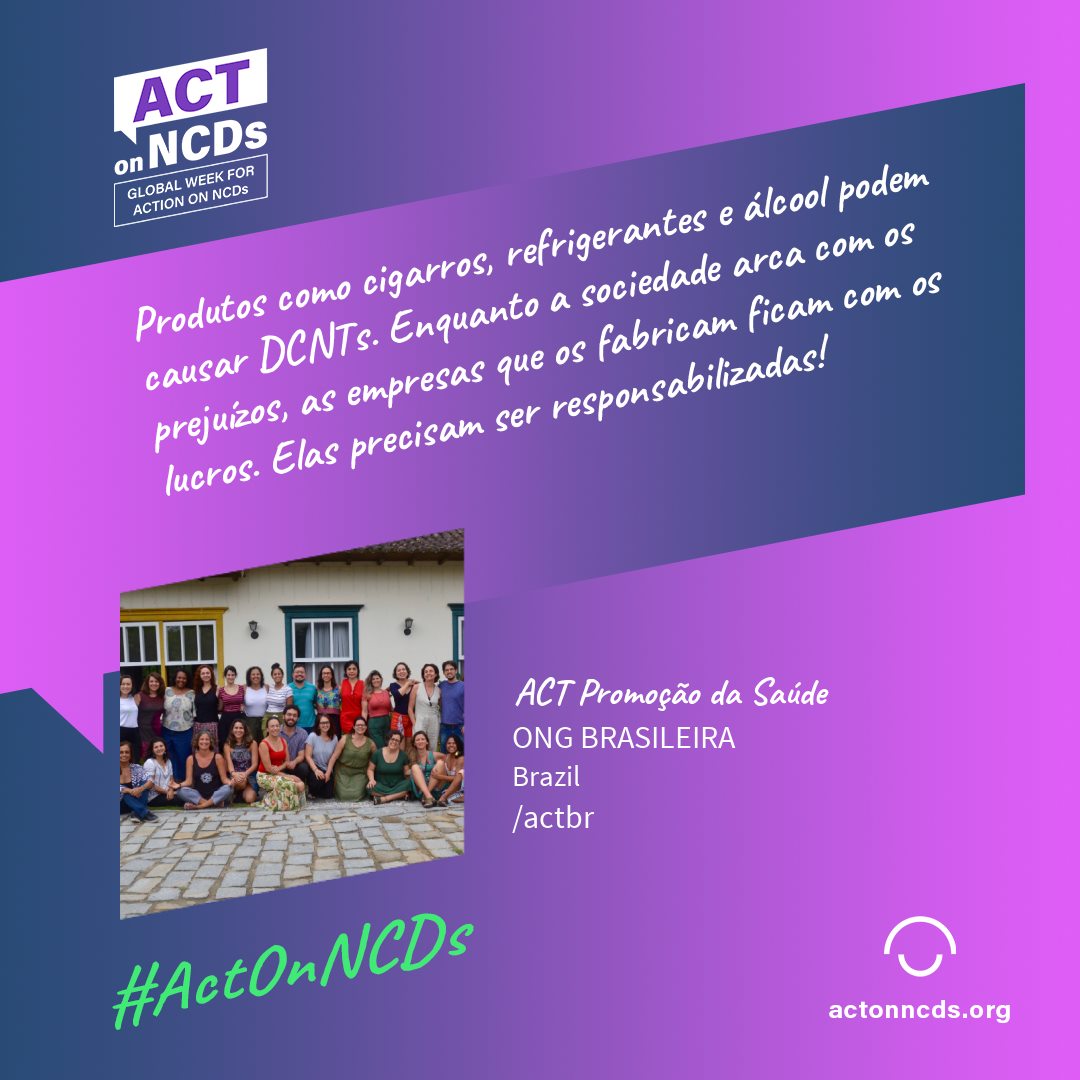 Global Action Week Against NCDs
Global Action Week Against NCDs
Annually in September, the NCD Alliance promotes the Global Action Week Against NCDs. The campaign theme in 2020 was the importance of accounts reporting and accountability by unhealthy product companies for damages to health. The ACT team published social media messages to support the date.
___________________________________________
2030 Agenda For Sustainable Development
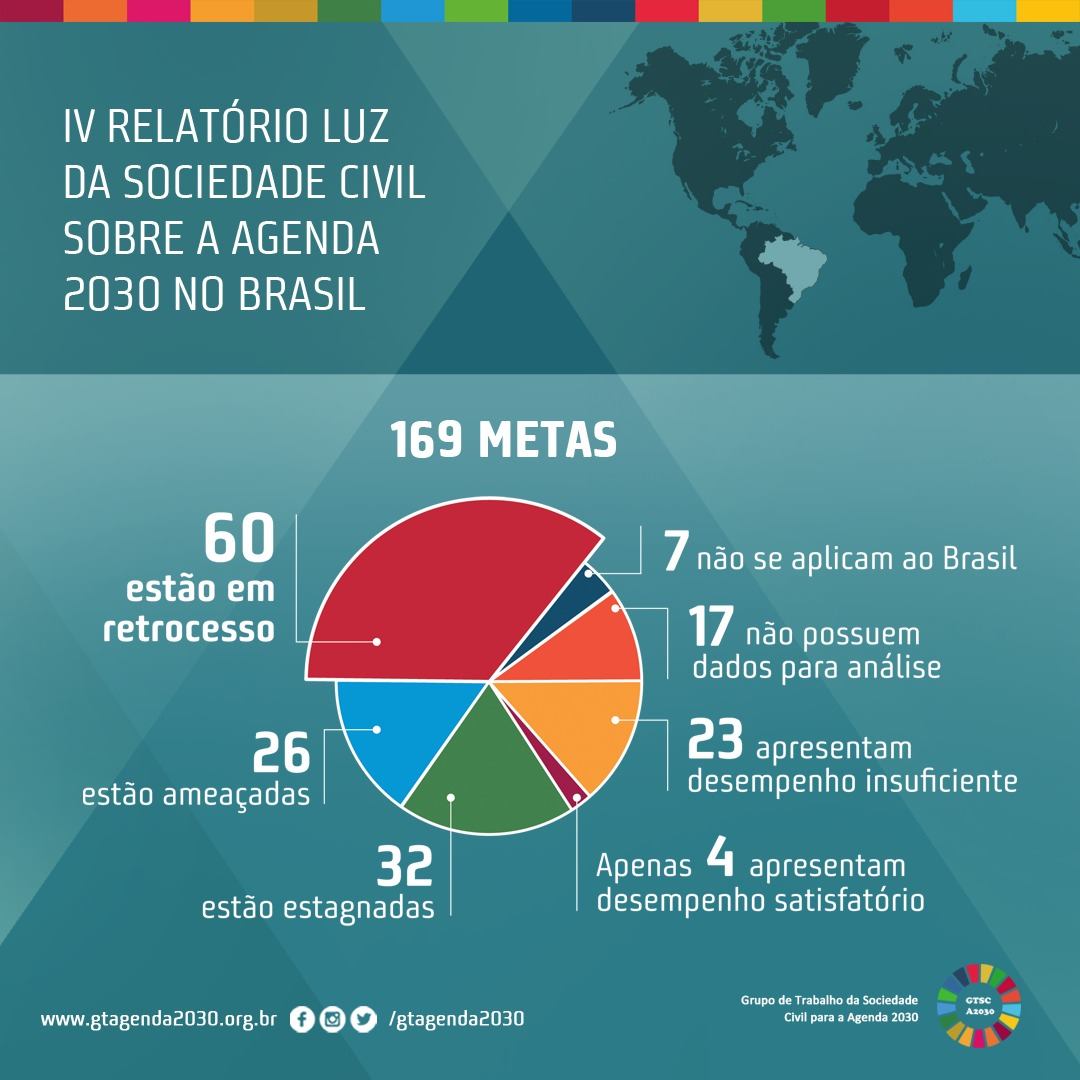 IV Spotlight Report for the 2030 Agenda
IV Spotlight Report for the 2030 Agenda
2020 marked the Agenda’s 5th year, but unfortunately, we have little to celebrate in Brazil. The country has not invested in the implementation of the Sustainable Development Goals (SDGs), and the result is clear: according to specialists who contributed to the 2020 edition of the Spotlight Report, launched in July by the Civil Society Working Group (Grupo de Trabalho da Sociedade Civil) for the 2030 Agenda, to which ACT is a party, we are experiencing a genuine tragedy foretold, where the fulfilment of all the SDGs is under threat.
The report also concluded that even severe consequences of the pandemic, such as increasing poverty and hunger, could have been eased if Brazil had, indeed, fulfilled its 2030 Agenda commitments.
With only ten years until the deadline, we need, more than ever, public policies promoting health, sustainability, education, the fight against poverty and other SDG-related areas so we can reach 2030 as a fairer country, leaving no one behind.
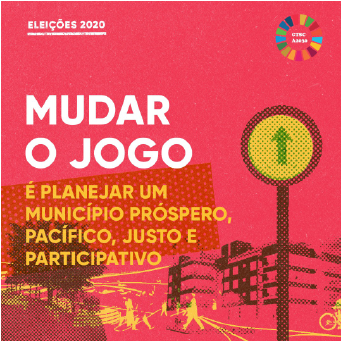 Campaigns
Campaigns
Throughout 2020, the 2030 Agenda Working Group supported and promoted many campaigns for measures that can help Brazil to reach the SDGs. We highlight two of them:
End the Spending Cap (Acaba Teto de Gastos)
Campaign for the end of Constitutional Amendment (EC) 95/2016, known as the Spending Cap. According to the campaign’s webpage, “EC 95 has caused perverse effects to the funding of social policies, mainly in health, education, housing, food security and social welfare, aggravated by the Covid-19 pandemic. In order to guarantee rights and face inequalities, the Brazilian State must restart investing in these areas.”
For the 2020 Elections, the Working Group devised a campaign to disclose the 17 SDGs and promote commitments by the candidates to the implementation of the 2030 Agenda. Some actions by partner organizations were listed, such as letters of proposition disclosed by ACT and by the Alliance for Adequate and Healthy Eating, as well as the production of material such as podcasts and videos.
____________________________________________
O Joio e o Trigo
The website of O Joio e o Trigo (“The Wheat and the Chaff”), which has been forming partnerships in a number of projects with ACT, continued their investigations into the food industry and conflicts of interest, increased the scope for agendas related to the tobacco industry and many other initiatives became a part of the investigative journalism group portfolio,currently considered one of the most credible and a reference in its areas of activity:
- July saw the launch of “Tidbit – edible investigations” (Bocado - investigações comestíveis), a network of Latin American reporters investigating issues related to food and diet in the region.
- In October, Victor Matioli and João Peres, from Joio, launched “Owners of the Market” (Donos do Mercado) through Editora Elefante publishers. The book analyzes the exponential growth of major supermarket chains, such as Pão de Açúcar and Carrefour, and exposes what lies behind it: predatory business models where employees are paid meagre wages and discarded, small farmers are excluded and diversity is suppressed.
- Joio’s podcast, “Full plate” (Prato Cheio), has been selected by Spotify as one of the best of 2020.
____________________________________________
Alliances Seminar
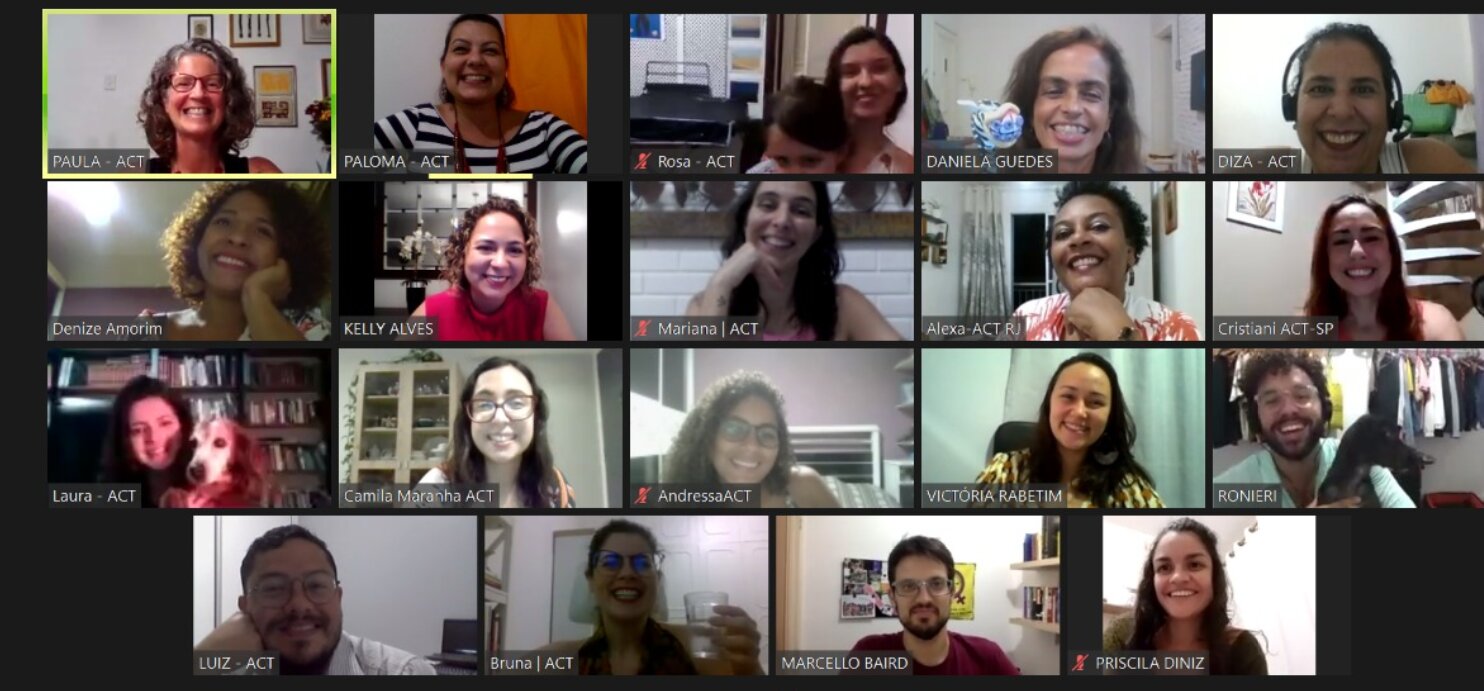
In 2020 the annual seminar “Strategic Alliances for Health Promotion” (Alianças Estratégicas para a Promoção da Saúde), organized by ACT, had to be held in virtual format. This did not prevent, however, the fruitful exchanges and debates between activists and civil society organizations in search of a healthier future for Brazilians.
Over three days, speakers and participants talked about the tax reform, advocacy practices in times of social distancing and conflicts of interest in actions carried out by the unhealthy product industries, such as tobacco, sodas and alcohol, especially during the Covid-19 pandemic. Theoretical presentations were interspersed with hands-on activities and group discussions.
____________________________________________
ACT Bulletin 167
Executive Board: Paula Johns (Director General), Mônica Andreis (Chief Executive), Anna Monteiro (Communications Director), Daniela Guedes (Campaigns and Mobilizations Director), Fabiana Fregona (Chief Financial Officer), Adriana Carvalho (Legal Director)
Editing: Anna Monteiro
Drafting: Anna Monteiro, Juliana Cenoz Waetge, Rosa Mattos
Review: Juliana Cenoz Waetge
ACT Legal: Adriana Carvalho, Joana Cruz, Renata Lima
Social media: Victória Rabetim
Graphic design: Ronieri Gomes
Translation: Take Five

